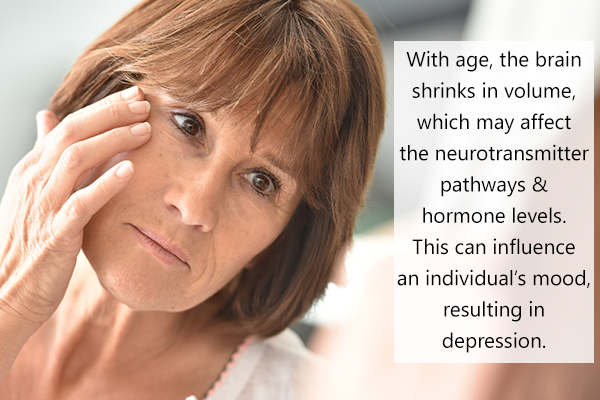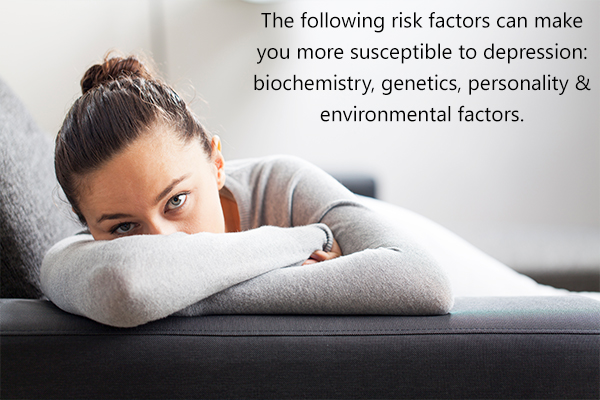In this article:
Depression is a complex and wide-ranging problem that manifests in different forms. It is usually impossible to trace depression back to its root cause, but several factors can contribute to its development.

Depression builds up over time due to a combination of recent and past events and other personal factors.
Causes of Depression
Some of the major contributing factors to the onset of depression include:
1. Trauma
Severe psychological distress may occur after exposure to disturbing events (accident, attack, or natural disaster).
Prolonged events such as emotional, sexual, or physical abuse during childhood, living in an unsafe environment, and other ongoing stressful conditions can also lead to trauma and, ultimately, depression.
2. Genetics
Depression can run in families, indicating a genetic component to this mood disorder.
The genes that are suspected to be associated with depression play different roles in the brain, such as the synthesis, activity, and transport of neurotransmitters. These are the chemicals that transmit signals between neurons.
3. Life circumstances
Various life events, such as the death of a loved one or a pet, can lead to severe grief that sometimes develops into depression. Additionally, separation, divorce, or the second marriage of a parent can also trigger depression in children.
The ability of a person to cope with a situation, positive thinking, and accepting support from others determine if such life situations can cause depression.
4. Drug and alcohol misuse
Some people resort to drugs and alcohol consumption to uplift their mood, cope with stress or emotions, and relieve the symptoms of undiagnosed depression.
Alcohol acts as a depressant on the central nervous system and can trigger symptoms of depression. Drug use also has potentially damaging side effects, which, in the long term, aggravate the symptoms of depression.
About a third of clinically depressed people abuse alcohol or drugs. (1)
5. Aging

With age, the brain shrinks in volume, which may affect the neurotransmitter pathways and hormone levels. This can influence an individual’s mood, resulting in depression.
6. Hormones
Women may develop depressive disorders due to changes in the levels of the hormones progesterone and estrogen.
These depressive disorders generally occur during pregnancy, perimenopause, menstrual cycle, menopause, or postpartum. Additionally, a hormonal imbalance can cause a miscarriage, which can trigger depression in some women.
7. Social media
With the advent of social media, it has become common for young adults and teenagers to connect to their peers electronically, rather than meeting in person. It is speculated that the connections made on social media platforms are not emotionally satisfying, often leading to a sense of isolation.
Research studies have shown a link between social media use and an increase in cases of depression.
8. Stress
Severe, prolonged stress can increase the risk of developing anxiety or depression.
9. Medical conditions
Health problems such as chronic pain, anxiety, sleep disturbances, and attention-deficit hyperactivity disorder (ADHD) can be contributing factors to depression in some individuals. Some medications can also trigger depression as a maladaptive side effect.
Risk Factors for Depression

Some people are more prone to depression than others on account of certain hereditary factors, biological determinants, or simply their personality type.
This is not to say that high-risk individuals will definitely develop depression, but they usually find it difficult to cope with crisis and traumatic events. They are not well adjusted enough to deal with life’s ordeals and thus easily fall prey to depression.
The following risk factors can make you more susceptible to depression:
- Biochemistry: Alterations in the chemicals in the brain can cause symptoms of depression.
- Genetics: You are at a higher risk of developing depression if it runs in your family. For instance, if an identical twin has depression, the other twin is 70% likely to develop depression as well.
- Personality: Having low self-esteem, constant negative thoughts, or continual stress can predispose you to depression.
- Environmental factors: Exposure to neglect, abuse, violence, or poverty can make people more prone to depression.
Final Word
Mental health is one of the most important but oft-neglected aspects of general well-being. People shy away from discussing depression due to some misplaced sense of embarrassment or shame, which further feeds into the problem.
However, the widespread prevalence of this condition throughout the world has compelled people to acknowledge its significance and normalize the discourse around it.
Depression may affect different people differently. Similarly, different people may have different coping mechanisms to fight depression. But everyone going through this ordeal invariably needs support, which can range from medication to someone to share your feelings with.
You cannot preempt depression as it sneaks up on you in subtle ways, but you can familiarize yourself with its signs and symptoms so that you can get timely support and treatment if it does occur.

- Was this article helpful?
- YES, THANKS!NOT REALLY


